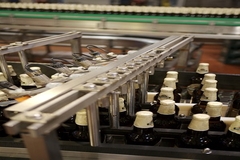
- Industry news
Industry news
- Category news
Category news
- Reports
- Key trends
- Multimedia
- Journal
- Events
- Suppliers
- Home
- Industry news
Industry news
- Category news
Category news
- Reports
- Key trends
- Multimedia
- Events
- Suppliers

The composting plant received official permission for composting labels in December of 2011.
Mar 5 2012 --- Sustainable development specialists from Radegast Brewery, together with composting specialists, came up with a solution for the ecological handling of disposable labels. The waste that is a by-product of washing bottles before their reuse is now used as a secondary raw material in compost production. Four hundred tons of disposable labels a year are now going to a composting plant, where they are processed and become a new industrial substrate in just 90 days. The substrate is used for the cultivation of landfills and dumps, roadside landscaping and other landscaping purposes.
"A secondary use of our waste is one of the priorities of our sustainable development strategy. At this time, we are handling most of our waste in an ecological way. Labels were one of the last problems we were looking to solve," said Ivo Kanák, Radegast Brewery manager.
The project commenced in September of 2011 with sampling, conducting analyses, and testing composting processes for labels at the plant. The composting plant received official permission for composting labels in December of 2011.
"The know-how for composting labels is a good future ecological solution for many food processing companies that, until now, were dumping their waste that was produced by washing recyclable packaging at landfills. Moreover, the composting is more economical. Our brewery saves 200.000 CZK a year now," Kanák added.
Disposable labels make up 30 percent of mass during the composting process. Other components include water-free sediments from water treatment plants, disposable plants, and liquid waste. The maturing process of compost takes place in special compartments for 90 days. Temperature inside the compost reaches up to 80°C (176¬°F).
A controlled process, carefully watched by specialists from a designated composting company, results in a landscaping substrate that is certified by the Central Control and Testing Agricultural Institute.











